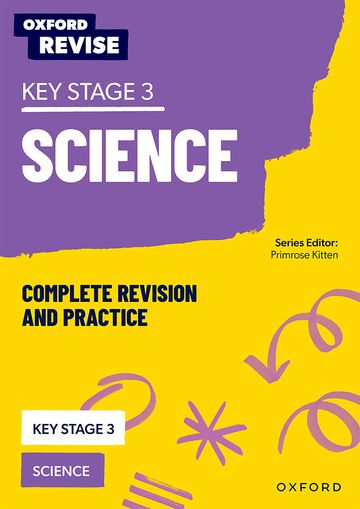Good study habits at KS3
Your GCSE exams might seem like a long way away, but there is a lot you can do now to make your life easier when you get to Year 11. Primrose Kitten explains how revising little and often will help you with your tests throughout Key Stage 3 and beyond.
Why revising for topic tests is important?
I want my students to go into their exams feeling confident, relaxed, and happy. They should be able to open the exam paper and feel like they recognise the questions. This may sound crazy and impossible, but it’s not!
Tests can be stressful, but they don’t have to be with the correct revision. The first step in revision is ensuring you know what you’re meant to know; Oxford Revise makes this easy as Knowledge Organisers have all the key information clearly laid out for you.
How long should you spend on revision?
Twenty minutes is a reasonable time for a revision session; any longer, you’ll stop taking in information. The Retrieval pages in your Oxford Revise guides are the perfect length for one revision session. There are lots of short retrieval questions; the answer is generally a single word or a very short sentence. You can do these with a friend or family member if you like!
The great thing about using retrieval questions as a regular revision tool is that the more practice your brain gets at retrieving information, the easier it will be to do during tests. The information you learn now will be revision for your KS3 tests and is the beginning of the knowledge for GCSEs and A Levels.
What are the best revision techniques?
Some students think the best way to revise is to spend hours reading and highlighting parts of their revision guide or copying their notes. Unfortunately, this isn’t revision; it’s being busy and tricking yourself into thinking you are learning something.
The best type of revision is active revision, where you answer questions. The Oxford Revise books have two different kinds of questions for you to use for active revision: short retrieval practice questions and longer exam practice questions. The mix of the two types of revision will help secure your knowledge and help you go into the test feeling more confident.
If you do exam-style questions regularly, when you get into the test the style of questions will be familiar, and the test will be less daunting, giving you an advantage.
Useful links
Revision books

KS3 Science
Develop a positive approach to revision with this specially designed revision guide for KS3 Science. It’s for you if you’re in Year 7, 8 or 9 and want to revise and practice what you’re learning in your Science lessons.